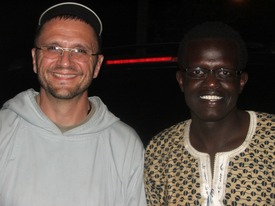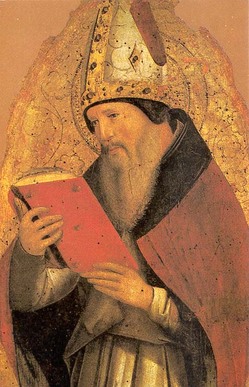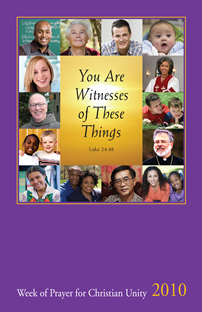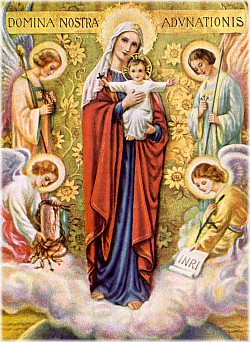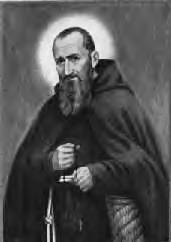 Lavishly he gave to the poor; his generosity shall endure forever.
Lavishly he gave to the poor; his generosity shall endure forever.
Tag: Franciscan
CFR Sudan Mission
Appeals for money on this blog are rare but I believe in giving to needy philanthropic projects. Plus, this request comes via my friend Henry who is connected with the priest in question (and seen to the right).
On my own recommendation I urge you to give because I believe the work and witness of the Franciscans. AND that I am in school with many Franciscan Friars of the Renewal, I am asking for consideration of Father Herald Brock’s mission work. Father Herald is a Franciscan Friar of the Renewal. Therefore, I want to encourage you to consider making a donation. Details about the situation are on Father Herald’s blog.
Donations in the form of checks or money orders made out to “CFR Sudan Mission,” can be sent to the following address:
CFR Sudan Mission
PO Box 1086
Secaucus, NJ 07096-1086
&nbs
p;
Please note in the memo box if you would like the funds to be used for hunger relief.
Build Together the City of God, Pope says to Catholic & Orthodox
The
following is the text Benedict XVI sent to Cardinal Walter Kasper, president of
the Pontifical Council for Promoting Christian Unity, on the occasion of the
11th Inter-Christian Symposium, which began today in Rome.
Through you,
venerable brother, in your capacity as president of the Pontifical Council for
Promoting Christian Unity, I have the pleasure and joy of sending a warm and
auspicious greeting to the organizers and participants of the 11th
Inter-Christian Symposium, promoted by the Franciscan Institute of Spirituality
of the Pontifical University Antonianum and by the Aristotle Orthodox
Theological Faculty of Thessalonica, planned in Rome from Sept. 3-5.
I am happy
first of all for this initiative of fraternal encounter and exchange on the
common aspects of spirituality, which is beneficial for a closer relationship
between Catholics and Orthodox. In fact, these Symposiums, which began in 1992,
address important and constructive topics for reciprocal understanding and unity
of intention. The fact that it takes place alternatively in a territory of
Catholic or Orthodox majority also allows for real contact with the concrete,
historical, cultural and religious life of our Churches.
In particular, this
year you wished to organize the Symposium in Rome, city that offers all
Christians indelible testimonies of history, archaeology, iconography,
hagiography and spirituality, strong stimulus to advance toward full communion
and above all, the memory of the Apostles Peter and Paul, Protothroni, and of
so many martyrs, ancient witnesses of the faith. Of them, St. Clement of Rome
wrote that “suffering … many insults and torments, they became a most
beautiful example for us” (Cf. Letter to the Corinthians, VI,1).
The topic
chosen for the next meeting: “St. Augustine in the Western and Eastern
Tradition” — argument intended to be developed in collaboration with the
Patristic Institute Augustinanum — is most interesting to reflect further on
Christian theology and spirituality in the West and in the East, and its
development. The Saint of Hippo, a great Father of the Latin Church, is, in
fact, of fundamental importance for theology and for the West’s very culture,
whereas the reception of his thought in Orthodox theology has revealed itself
to be rather problematic.
Hence, to know with historical objectivity and
fraternal cordiality the doctrinal and spiritual riches that make up the
patrimony of the Christian East and West, is indispensable not only to
appreciate them, but also to promote better reciprocal appreciation among all
Christians.
Therefore, I express cordial wishes that your Symposium is fruitful
in that it discovers doctrinal and spiritual convergences that are useful to
build together the City of God, where his children can live in peace and in
fraternal charity, based on the truth of the common faith. I assure you of my
prayer for this end, asking the Lord to bless the organizers and the
institutions they represent, the Catholic and Orthodox speakers and all the participants.
May the Grace and peace of the Lord be in your collaborators and in your minds!
In Castel Gandolfo,
August 28, 2009
Benedictus PP. XVI
Franciscans cultivate possibilities for change for addicts
Some of our brothers and sisters have found themselves in a downward spiral that could end in premature death if a fundamental change doesn’t happen: getting & remaining clean. It’s easy to pontificate about the necessity to get and stay clean “or else,” perhaps even trying brow-beat someone into change hoping to trigger a desire to live more healthily. None this works. The simple thing is to allow God’s grace to work and to have a clean environment to live and work, to provide competent professional help and to make opportunities available for substantive change to happen. One more ingredient in my book that’s essential and a non-negotiable is the spiritual. Prayer, spiritual direction and fidelity to the witness of the Church goes to the root level of human desires and happiness given us by Divine Providence. But we have to admit that unless a drug addict wants to change her life no amount clever argument or cute programing is going to matter. If a person doesn’t take his human heart (his desires) seriously, including his need of happiness, then there is little we who aren’t captured by addiction can do.
2010 Week of Prayer for Christian Unity: You are witness of these things
Since 1908 the Church has called upon us to join in prayer with
other Christians around the world during the Week of Prayer for Christian
Unity. We do this work of prayer as an education in hope for spiritual and actual Christian unity realizing that the Holy Spirit is the only one capable of bring unity among various groups of Christians. The proposal for a week of prayer was initiated in the USA by Franciscans of the Atonement Father Paul
Wattson and it is held from January 18 – 25. Today the observance is international in scope.
It is generally held that the 1910
World Mission Conference in Edinburgh, Scotland, marked the beginnings of the
modern ecumenical movement.
In tribute, the promoters of the Week of Prayer for
Christian Unity, the Commission on Faith and Order and the Pontifical Council for
Promoting Christian Unity, invited the Scottish churches to prepare this year’s
theme. They suggested: “You are
witnesses of these things” (Luke 24:48).
The 2010 theme is a reminder that as the
community of faith those reconciled with God and in Christ, “You are witness of
these things“–witness to the truth of the power of salvation in Jesus Christ
who will also make real his prayer,
“That all may be one…so the world may believe.” *Witness gives praise
to the Presence who gives us the gift of life and resurrection; by knowing how
to share the story of our faith with others; by recognizing that God is at work
in our lives; by giving thanks for the faith we have received; by confessing
Christ’s victory over all suffering; by seeking to always be more faithful to
the Word of God; by growing in faith, hope and love; and by offering
hospitality and knowing how to receive it when it is offered to us.
Materials
to observe the Week of Prayer for Christian Unity are available from the
Graymoor Ecumenical and Interreligious Institute, a ministry of the Franciscan Friars
of the Atonement.
For more information visit www.geii.org
Sean Patrick O’Malley: 25 years a bishop
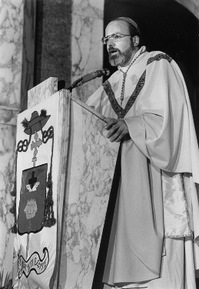 25 years ago Capuchin Father Sean Patrick O’Malley was ordained a bishop. Currently he’s the cardinal-archbishop of Boston but not before periods of episcopal ministry in the US Virgin Islands, Fall River, Palm Beach.
25 years ago Capuchin Father Sean Patrick O’Malley was ordained a bishop. Currently he’s the cardinal-archbishop of Boston but not before periods of episcopal ministry in the US Virgin Islands, Fall River, Palm Beach.
Our Lady of the Angels of the Portiuncula
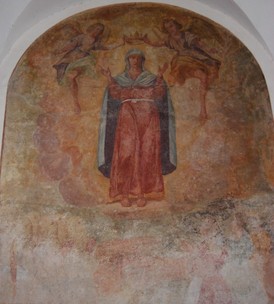 Today is the feast of Our Lady of the Angels of the Portiuncula, the Virgin under whose mantle Saint Francis of Assisiwas wrapped; Mary’s maternal protection made it possible for blessed Francis to experience an intentse Presence of the Lord and to receive his vocation to rebuild the Church. The Portiuncula is also the place where Francis knew first hand the experience of being sustained by the Angels. Likewise his intimate devotion to the Blessed Mother, under whose protection did he place himself to do the Lord’s work did this place become holy for the members of the Franciscan family and for the Church universal. As a place of pilgrimage, the holy Portiuncula is a poignant reminder of how important the encounter with Christ was for Saint Francis and how much the encounter ought to be pivotal for us today. Without meeting Christ, little makes sense. Saint Bonaventure had this to say about this devotion:
Today is the feast of Our Lady of the Angels of the Portiuncula, the Virgin under whose mantle Saint Francis of Assisiwas wrapped; Mary’s maternal protection made it possible for blessed Francis to experience an intentse Presence of the Lord and to receive his vocation to rebuild the Church. The Portiuncula is also the place where Francis knew first hand the experience of being sustained by the Angels. Likewise his intimate devotion to the Blessed Mother, under whose protection did he place himself to do the Lord’s work did this place become holy for the members of the Franciscan family and for the Church universal. As a place of pilgrimage, the holy Portiuncula is a poignant reminder of how important the encounter with Christ was for Saint Francis and how much the encounter ought to be pivotal for us today. Without meeting Christ, little makes sense. Saint Bonaventure had this to say about this devotion:
The Portiuncula was an old church dedicated to the Virgin Mother of God which was abandoned. Francis had great devotion to the Queen of the world and when he saw that the church was deserted, he began to live there constantly in order to repair it. He heard that the Angels often visited it, so that it was called Saint Mary of the Angels, and he decided to stay there permanently out of reverence for the angels and love for the Mother of Christ. This is also the place where St Clare took her vows and where Saint Francis died.
Consider the words of an early biographer of Saint Francis of Assisi:
From there he moved to another place, which is called the “Portiuncula,” where there stood a church of the Blessed Virgin Mother of God built in ancient times. At that time it was deserted and no one was taking care of it. When the holy man of God saw it so ruined, he was moved by piety because he had a warm devotion to the Mother of all good and he began to stay there continually. The restoration of that church took place in the third year of his conversion. At this time he wore a sort of hermit’s habit with a leather belt. He carried a staff in his hand and wore shoes. One day the gospel was being read in that church about how the Lord sent out his disciples to preach. The holy man of God, who was attending there, in order to understand better the words of the gospel, humbly begged the priest after celebrating the solemnities of the Mass to explain the gospel to him. The priest explained it all to him thoroughly line by line. When he heard that Christ’s disciples should not possess gold or silver or money, or carry on their journey a wallet or a sack, nor bread nor a staff, not to have shoes nor two tunics, but that they should preach the kingdom of God and penance, the holy man, Francis immediately exulted in the spirit of God. “This is what I want,” he said, “this is what I seek, this is what I desire with all my heart.” The holy father, overflowing with joy, hastened to implement the words of salvation, and did not delay before he devoutly began to put into effect what he heard. (From The Life of Saint Francis by Thomas of Celano)
Read about and perhaps seek The Portiuncula Indulgence if you visit any Franciscan Church and observe the conditions for receiving the indulgence.
The Holy Father made reference to this in his Sunday Angelus address:
… today is the feast of the “Pardon of Assisi,” which St. Francis obtained from Pope Honorious III in the year 1216, after having a vision while he was praying in the little church of the Portiuncula. Jesus appeared to him in his glory, with the Virgin Mary on his right and surrounded by many Angels. They asked him to express a wish and Francis implored a “full and generous pardon” for all those who would visit that church who “repented and confessed their sins”. Having received papal approval, the Saint did not wait for any written document but hastened to Assisi and when he reached the Portiuncula announced the good news: “Friends, the Lord wants to have us all in Heaven!”. Since then, from noon on 1 August to midnight on the second, it has been possible to obtain, on the usual conditions, a Plenary Indulgence, also for the dead, on visiting a parish church or a Franciscan one.
A note about indulgences, which are often misunderstood. Indulgences are not forgiveness for sin but forgiveness for temporal punishment due to sin; that the residual effects of sin are forgiven.
Also, visit The Shrine website (read in 3 languages)
On this feast we pray
August Queen of Heaven, sovereign queen of Angels, you who at the beginning received from God the power and the mission to crush the head of Satan, we beseech you humbly, send your holy legions so that, on your orders and by your power, they will track down demons, fight them everywhere, curb their audacity and plunge them into the hell.
Who can be compared to God? Oh good and tender Mother, you will always be our love and our hope. Oh divine Mother, send the Holy Angels and Archangels to defend me and to keep the cruel enemy far from me. Holy Angels and Archangels defend us, protect us. Amen.
Capuchins reflect on their work in the Amazon
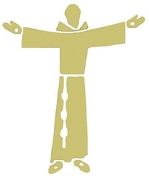 The Capuchins in Italy are taking time to reflect on
The Capuchins in Italy are taking time to reflect on
the greatest God-given gift they’ve received: work of 100 years among the native Brasilian
peoples. What really struck me was the Provincial’s comment: “And we truly lived it as
a gift: participating in His mission, that is to say, the mission of Jesus
Christ.”
Jesuits suppressed: the 236th anniv
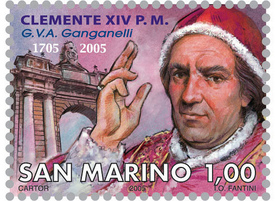 Today is the 236th anniversary of the promulgation of Dominus ac Redemptor, the papal bull of Pope Clement XIV (a Conventual Franciscan) suppressing the Society of Jesus (the Jesuits). In this bull the pope dissolved the Society without condemning it because it is said that he did revere many of its members. Hence, the suppression had nothing to do with enmity (Franciscans vs. Jesuits) as much as it had to do with the significant criticism the Society faced and the likely realization of the threat of Church schism if the pope didn’t do something with the Jesuits. Faced with the pressure of a fragmented Church, Clement did what he had to do. By the time of this unusual papal intervention, the Jesuits were expelled from Brasil, Portugal, France, Spain and Parma.
Today is the 236th anniversary of the promulgation of Dominus ac Redemptor, the papal bull of Pope Clement XIV (a Conventual Franciscan) suppressing the Society of Jesus (the Jesuits). In this bull the pope dissolved the Society without condemning it because it is said that he did revere many of its members. Hence, the suppression had nothing to do with enmity (Franciscans vs. Jesuits) as much as it had to do with the significant criticism the Society faced and the likely realization of the threat of Church schism if the pope didn’t do something with the Jesuits. Faced with the pressure of a fragmented Church, Clement did what he had to do. By the time of this unusual papal intervention, the Jesuits were expelled from Brasil, Portugal, France, Spain and Parma.
Our Lady of the Atonement
Father Paul Wattson, the founder with Mother Lurana White, of the Franciscan Friars and Sisters of the Atonement, gave hundreds of sermons, conducted numerous retreats, delivered many radio addresses and wrote extensively in four magazines: The Pulpit of the Cross, The Lamp, The Candle and The Antidote.
The following piece is Father Wattson’s commentary on the feast of Our Lady of the Atonement. This Marian feast was approved by the Holy See in 1946 but it was first observed in July 1901.
The theological datum on atonement and therefore mercy, is near-and-dear to the heart of the Church and indeed to all Christians, so today’s feast is apt. Let us pray for each other!
I am writing this letter on the day which we are accustomed to observe at Graymoor in special honor of Our Lady of the Atonement. This particular name of Our Blessed Mother is very dear to us and we believe it is dear to Our Lady herself. We hold it as among the most treasured and sacred traditions of our Institute that it was the Blessed Virgin who first taught us to call her by that name and there are cogent reasons why she should give this title a favorite place among the many by which she is invoked.
First among these reasons must be her own devotion to the mystery of the Atonement, for it was by the death of her son on the Cross, which cost him the last drop of his blood and made her preeminently the mother of sorrows, that the wall of division between God and man was broken down and both were made one (Ephesians 2:14), through Christ’s atoning sacrifice.
As the Blessed Virgin is inseparably associated with our divine redeemer in the mystery of his incarnation, so is she closely associated with him in the great act of the atonement. Thus, is she always represented in the Gospel and in the liturgy and thought of the Catholic Church as standing by the cross, when Christ was crucified there.
There is a second reason, hardly less weighty than the first, why the title, Our Lady of the Atonement, should powerfully appeal to the mother of God. It was through the Incarnation she become the mother of Christ, but through the atonement she became the new Eve and the mother of all the regenerate, who being redeemed by the precious blood are predestined to eternal life as the adopted sons of God and heirs of the Kingdom of Heaven. The third time Our Lord spoke upon the cross it was to emphasize this phase of the Atonement, when he said to his mother: “Woman, behold your son,” and to St. John, “Son, behold your mother.” [John 19:26-27] Thus by virtue of the atonement Mary is the mother of all who live through Christ. Can anyone therefore possibly conceive the depth of significance this title “Our Lady of the Atonement” must possess for Our Blessed Mother herself?
But someone will ask, if so highly esteemed, why should it be kept hidden for nineteen hundred years, to be made known to the faithful in the twentieth century? Is it not the custom even of earthly mothers to preserve the choicest
fruits in the summer time and hide them away under lock and key, to bring them forth to their children’s delight in the depth of winter and did not the master of the wedding feast say to the bridegroom at Cana,
|
Every man at first brings forth good wine and when men have well drunk, then that which is worse. But you have kept the good wine until now. [John 2:10] |
|
“My ways are not your ways,” [Isaiah 55:8] says the Lord of Hosts. (The Lamp, August 1919, pp.503-4) |
